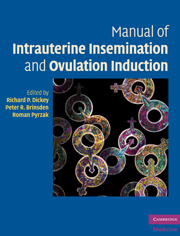Book contents
- Frontmatter
- Contents
- List of contributors
- Preface
- 1 An overview of intrauterine insemination and ovulation induction
- 2 Male causes of infertility: evaluation and treatment
- 3 Female causes of infertility: evaluation and treatment
- 4 Clinic and laboratory design, personnel and equipment
- 5 Semen analysis: semen requirements for intrauterine insemination
- 6 Semen preparation for intrauterine insemination
- 7 Ovulation induction for intrauterine insemination I: oral drugs clomiphene, tamoxifen, letrozole
- 8 Ovulation induction for intrauterine insemination II: gonadotropins and oral drug–gonadotropin combinations
- 9 Ultrasonography in the management of ovulation induction and intrauterine insemination
- 10 Insemination technique and insemination complications
- 11 Cryopreservation
- 12 Donor sperm
- 13 The role of the nurse in intrauterine insemination and ovulation induction
- 14 Complications of ovulation induction I: high-order multiple births, miscarriage, ectopic pregnancy, congenital anomalies, ovarian cancer
- 15 Complications of ovulation induction II: ovarian hyperstimulation syndrome, ovarian torsion
- 16 The psychological issues of intrauterine insemination
- 17 Ethical, legal and religious considerations of artificial insemination
- Index
16 - The psychological issues of intrauterine insemination
Published online by Cambridge University Press: 01 February 2010
- Frontmatter
- Contents
- List of contributors
- Preface
- 1 An overview of intrauterine insemination and ovulation induction
- 2 Male causes of infertility: evaluation and treatment
- 3 Female causes of infertility: evaluation and treatment
- 4 Clinic and laboratory design, personnel and equipment
- 5 Semen analysis: semen requirements for intrauterine insemination
- 6 Semen preparation for intrauterine insemination
- 7 Ovulation induction for intrauterine insemination I: oral drugs clomiphene, tamoxifen, letrozole
- 8 Ovulation induction for intrauterine insemination II: gonadotropins and oral drug–gonadotropin combinations
- 9 Ultrasonography in the management of ovulation induction and intrauterine insemination
- 10 Insemination technique and insemination complications
- 11 Cryopreservation
- 12 Donor sperm
- 13 The role of the nurse in intrauterine insemination and ovulation induction
- 14 Complications of ovulation induction I: high-order multiple births, miscarriage, ectopic pregnancy, congenital anomalies, ovarian cancer
- 15 Complications of ovulation induction II: ovarian hyperstimulation syndrome, ovarian torsion
- 16 The psychological issues of intrauterine insemination
- 17 Ethical, legal and religious considerations of artificial insemination
- Index
Summary
Introduction
It is important for the physician to recognize the psychological issues involved in fertility treatment. The emotions and attitudes of the couple can be powerful, conflictual and problematic in making decisions regarding the treatment options facing them. The physician must be aware of and understand the patients' feelings/beliefs in order to guide the couple in a direction that will provide a positive outcome.
Intrauterine insemination using husband/partner sperm
A recommendation of intrauterine insemination (IUI) can be difficult for the couple to accept, even if the husband's or partner's sperm is to be used. This relatively low level of intervention may be recommended after a complete fertility evaluation and several months of a couple trying unsuccessfully on their own to achieve a pregnancy. The medical reason for recommending IUI may relate to poor fertility status of the male sperm or poor fertility status of the female reproductive environment, or both.
If the medical diagnosis of infertility rests with the man, he may experience feelings of guilt and doubt about his potency in not being able to impregnate his partner through normal sexual intercourse. Such a diagnosis may affect his sense of masculinity. He may experience feelings of anger because he cannot achieve something, without medical intervention, that should be a natural expression of physical intimacy. The woman may also feel anger and/or resentment toward her partner if the problem lies with his sperm.
If IUI is recommended because of a condition in the woman, she may experience feelings of guilt and inadequacy, and a general lowering of self-esteem.
Information
- Type
- Chapter
- Information
- Manual of Intrauterine Insemination and Ovulation Induction , pp. 160 - 164Publisher: Cambridge University PressPrint publication year: 2009
